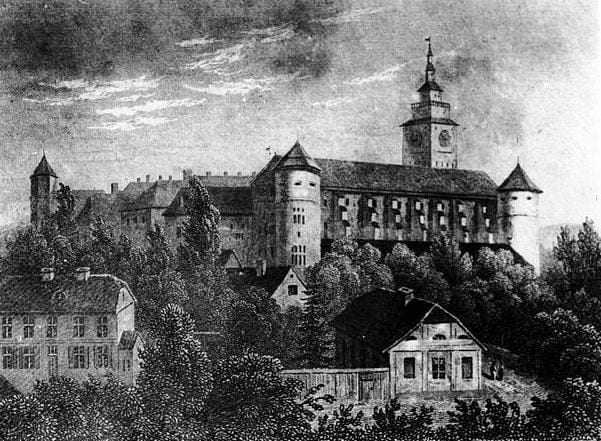
An old postcard showing Königsberg Castle, with the home of Immanuel Kant in the foreground
A discussion elsewhere reminds me of a passage that I really enjoyed writing several decades ago. Although I essentially wrote the words below, they appeared in William J. Hamblin, “An Apologist for the Critics: Brent Lee Metcalfe’s Assumptions and Methodologies,” in Review of Books on the Book of Mormon 6/1 (1994): 434-523 (specifically pages 480-481):
[Brent] Metcalfe and Dan Vogel would have us believe that Joseph’s cosmology is somehow related to ideas found in Benjamin Franklin’s private unpublished papers of 1728, composed a century before Joseph wrote.91
Going a step further, they seem to maintain that Joseph may have had a predilection for reading Kant in the original German. “Immanuel Kant claimed that the moral perfection of each planet’s inhabitants increased ‘according to the proportion of [its] distance from the sun.’ Certainly in such an intellectual climate, Joseph Smith’s ideas about pluralism and astronomical hierarchy were not unusual.”92 The passage they cite as illustrative of Joseph’s “intellectual climate” is from Kant’s 1755 work, Allgemeine Naturgeschichte und Theorie des Himmels, oder Versuch von der Verfassung und dem mechanischen Ursprunge des ganzen Weltgebäudes nach Newtonischen Grundsätzen abgehandelt. But their choice of a work to illustrate Joseph’s “intellectual climate” is particularly unfortunate. “The book’s publisher . . . went bankrupt just at the time Kant’s work was to have been published. His stock was impounded, and as a result copies of the book were for a long time simply unavailable.”93 Even after being reprinted, “like some other memorable cases of books that came ‘stillborn from the press,’ Kant’s [work] … was virtually unknown in its own day; indeed, it had to wait for more than a century [i.e., until after 1855] for its true greatness to be appreciated.”94 For example, “In England, Herschel [1738-1822, a native German living in England, and the greatest astronomer of his day], for all his ties with Hannover. did not learn about Kant’s cosmology.”95 The work was first translated into English in 1900, nearly six decades after Joseph Smith’s death.96
Vogel and Metcalfe’s argument that Kant’s work was somehow part of the “intellectual climate” of early nineteenth-century frontier New York is laughable, and is perhaps the most patently absurd of the many environmentalist claims which I have read. I can just imagine the sturdy country yeomen of the Palmyra region gathering in a local tavern for their weekly discussions of the “categorical imperative” over a tankard of ale. Meanwhile, they spend their free moments between milking the cows, splitting rails, and plowing, in brushing up on their philosophical German so they can devour the latest of Kant’s untranslated works late at night by candlelight.
91 Vogel and Metcalfe, “Joseph Smith’s Scriptural Cosmology,” in The Word of God, 217 n. 68. It must be emphasized, furthermore, that, in terms of his religious thought, Franklin was not a representative figure of his times.
92 Ibid., 207.
93 Milton K. Munitz, in the introduction to Immanuel Kant, Universal Natural History and Theory of the Heavens (Ann Arbor: University of Michigan Press, 1969), vii. I would like to thank Daniel C. Peterson for his assistance on this section.
94 Ibid., viii.
95 Stanley L. Jaki. trans. and ed., in his edition of Immanuel Kant, Universal Natural History and Theory of the Heavens (Edinburgh: Scottish Academic Press 1981), 49.
96 Ibid., 1-2.










